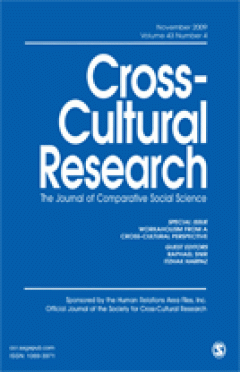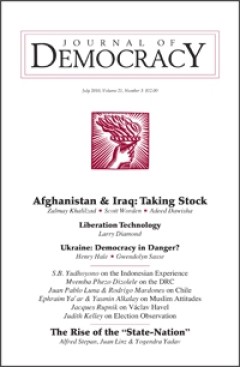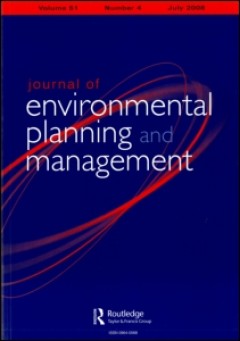Filter by

Relationships Between Perceived Teachers’ and Parental Behavior and Adolesc…
This study addresses relationships between perceived maternal, paternal, and teacher acceptance and behavioral control, and adolescents’ psychological adjustment, school conduct, and academic achievement in Estonia. A total of 224 sixth graders respond to 3 self-report measures. Adolescents’ school conduct and grade point average (GPA) are reported by teachers. Study findings show that girls’ p…
- Edition
- Vol. 44 no. 3 August 2010 pp. 222-238
- ISBN/ISSN
- 10693971
- Collation
- -
- Series Title
- Cross-Cultural Research
- Call Number
- -

The Relationship Between Perceived Teacher and Parental Acceptance, School Co…
This study explored the relationship between students’ perceptions of their teachers’ and parents’ (mothers’ and fathers’) acceptance, and teachers’ reports of the students’ conduct in school as well as students’ reports of their own psychological adjustment. The study was conducted on a sample of 200 high school students in Bangladesh. Results showed that, on average, Bangladeshi students perc…
- Edition
- Vol. 44 no. 3 August 2010 pp. 239-252
- ISBN/ISSN
- 10497315
- Collation
- -
- Series Title
- Cross-Cultural Research
- Call Number
- -

Perceived Teacher and Parental Acceptance and Behavioral Control, School Cond…
This study explored the relationship between Indian adolescents’ perceptions of their teachers’ and parents’ (mothers’ and fathers’) acceptance and behavioral control, students’ conduct in school, and students’ psychological adjustment. A sample of 217 high school students in India was enrolled in the study. Results showed that the students perceived their teachers, mothers, and fathers to be w…
- Edition
- Vol. 44 no. 3 August 2010 pp. 253-268
- ISBN/ISSN
- 10693971
- Collation
- -
- Series Title
- Cross-Cultural Research
- Call Number
- -

Perceived Teachers’ Acceptance, Parental Acceptance, Behavioral Control, Sc…
The goal of this research was to explore the relationship between Kuwaiti students’ perceptions of their teachers’ and parents’ (mothers’ and fathers’) acceptance and behavioral control and students’ conduct in school, and psychological adjustment. A sample of 205 middle school students in Kuwait was enrolled in the study. Results showed that both boys and girls perceived their parents and teac…
- Edition
- Vol. 44 no. 3 August 2010 pp. 269-282
- ISBN/ISSN
- 10693971
- Collation
- -
- Series Title
- Cross-Cultural Research
- Call Number
- -

Perceived Teacher Acceptance, Parental Acceptance, Academic Achievement, and …
This study investigated the effects of perceived teacher acceptance as well as perceived maternal and paternal acceptance on the academic achievement and school conduct of 362 seventh-grade adolescents in the Mississippi Delta region of the United States. Results showed a significant correlation between perceived teacher acceptance and boys’ (but not girls’) overall grade point average (GPA). P…
- Edition
- Vol. 44 no. 3 August 2010 pp.283-294
- ISBN/ISSN
- 10693971
- Collation
- -
- Series Title
- Cross-Cultural Research
- Call Number
- -

Influence of Perceived Teacher Acceptance, Self-Concept, and School Attitude …
This study investigated the influence of perceived teacher acceptance, children’s self-concept, and children’s attitude toward school on children’s academic achievement. The sample included 223 fifth-grade students in Istanbul, Turkey. The Teacher Acceptance-Rejection/Control Questionnaire, Piers-Harris Self-Concept Scale, and School Attitude Assessment Survey-Revised were utilized in data coll…
- Edition
- Vol. 44 no. 3 August 2010 pp. 295-309
- ISBN/ISSN
- 10693971
- Collation
- -
- Series Title
- Cross-Cultural Research
- Call Number
- -

The Uses of Divided Power
The 2010 presidential election shows that Ukraine is both a surprisingly stable electoral democracy and a disturbingly corrupt one. The corruption, moreover, may have a lot to do with the stability.
- Edition
- Vol. 20, No. 3, July 2010, pp. 84-98
- ISBN/ISSN
- 10455736
- Collation
- -
- Series Title
- Journal of Democracy
- Call Number
- -

Regional governance and hazard information: the role of co-ordinated risk ass…
With the threat of wildfire hanging over many communities in the Western and Southern United States, wildfire mitigation is evolving into a significant public responsibility for rural and urban edge county governments. Regional governance is an important piece of the effort to reduce wildfire risks although still weakly developed as a policy arena. This project explores two dimensions in which …
- Edition
- Volume 53, Issue 1 January 2010 , pages 1 - 21
- ISBN/ISSN
- 09640568
- Collation
- -
- Series Title
- Journal of Environmental Planning and Management
- Call Number
- -

Moving from agenda to action: evaluating local climate change action plans
Climate change is conventionally recognised as a large-scale issue resolved through regional or national policy initiatives. However, little research has been done to directly evaluate local climate change action plans. This study examines 40 recently adopted local climate change action plans in the US and analyses how well they recognise the concepts of climate change and prepare for climate c…
- Edition
- Volume 53, Issue 1 January 2010 , pages 41 - 62
- ISBN/ISSN
- 09640568
- Collation
- -
- Series Title
- Journal of Environmental Planning and Management
- Call Number
- -

Measuring neighbourhood air pollution: the case of Seattle's international di…
Current US regulatory air quality monitoring networks measure ambient levels of pollutants and cannot capture the effects of mobile sources at the micro-scale. Despite the fact that overall air quality has been getting better, more vulnerable populations (children, the elderly, minorities and the poor) continue to suffer from traffic-related air pollution. As development intensifies in urban ar…
- Edition
- Volume 53, Issue 1 January 2010 , pages 23 - 39
- ISBN/ISSN
- 09640568
- Collation
- -
- Series Title
- Journal of Environmental Planning and Management
- Call Number
- -

A contextual framework for understanding good practice in integrated catchmen…
Principles of good practice for collaborative resource management were derived from the literature and their use studied in a range of integrated catchment management processes. Desk-based reviews and interviews with participants allowed the principles to be refined and described within a framework that illustrates the interrelationships between core principles, enabling principles, precursors …
- Edition
- Volume 53, Issue 1 January 2010 , pages 63 - 89
- ISBN/ISSN
- 09640568
- Collation
- -
- Series Title
- Journal of Environmental Planning and Management
- Call Number
- -

The values of biological diversity: a travelogue
Biological diversity is an abstract, scientific concept and both evaluating its condition and, to great extent, justifying its conservation requires expert knowledge. Accordingly, regulating and managing biological diversity presupposes standardisation and methods for managing uncertainty. To be acted on, the concept must be promoted, passing, in this process, through various institutions, such…
- Edition
- Volume 53, Issue 1 January 2010 , pages 91 - 105
- ISBN/ISSN
- 09640568
- Collation
- -
- Series Title
- Journal of Environmental Planning and Management
- Call Number
- -

Take your swimsuit along: the value of improving urban bathing sites in the m…
Many inhabitants of Berlin enjoy bathing in lakes and rivers during the summer. However, so far no data exist about who goes bathing and what quality bathers expect from bathing sites. In an online survey conducted during the summer of 2007 respondents were presented with a choice experiment concerning various attributes of bathing sites such as water quality or cleanliness of the beach. Applyi…
- Edition
- Volume 53, Issue 1 January 2010 , pages 107 - 124
- ISBN/ISSN
- 09640568
- Collation
- -
- Series Title
- Journal of Environmental Planning and Management
- Call Number
- -

International retirement migration in the Alicante region, Spain: process, sp…
International retirement migration has become an increasing phenomenon in the Mediterranean region of Alicante, Spain. Through an interdisciplinary approach, relationships between the migration process, landscape change and environmental impacts are examined. Lifestyle-related perceptions and demands of UK retirees are studied as a major driving force of urbanisation. The extent and quality of …
- Edition
- Volume 53, Issue 1 January 2010 , pages 125 - 141
- ISBN/ISSN
- 09640568
- Collation
- -
- Series Title
- Journal of Environmental Planning and Management
- Call Number
- -

Performance and dilemmas of urban containment strategies in the transformatio…
The implementation of urban containment policies is increasingly attracting attention in environment management. Rapid urban growth and the coexistence of decentralisation and marketisation challenge containment strategies that are implemented to control urban sprawl. This challenge is likely to be greater in a transformation country than in developed countries. This paper evaluates the perform…
- Edition
- Volume 53, Issue 2 March 2010 , pages 143 - 161
- ISBN/ISSN
- 09640568
- Collation
- -
- Series Title
- Journal of Environmental Planning and Management
- Call Number
- -

Better than their reputation: enhancing the validity of contingent valuation …
Although contingent valuation is the dominant technique for the valuation of public projects, especially in the environmental sector, the high costs of contingent valuation surveys prevent the use of this method for the assessment of relatively small projects. The reason for this cost problem is that typically only contingent valuation studies which are based on face-to-face interviews are acce…
- Edition
- Volume 53, Issue 2 March 2010 , pages 163 - 182
- ISBN/ISSN
- 09640568
- Collation
- -
- Series Title
- Journal of Environmental Planning and Management
- Call Number
- -

Sustainable land-use planning: revitalising a flood prone office park
This paper describes an applied research project that used a sustainable land-use planning approach to examine flood hazard mitigation alternatives in a 536-acre developed office park complex. A watershed-wide assessment including floodplain remapping and modelling of low-impact and large stormwater improvements throughout the upper watershed revealed limited impact on reducing flooding downstr…
- Edition
- Volume 53, Issue 2 March 2010 , pages 183 - 196
- ISBN/ISSN
- 09640568
- Collation
- -
- Series Title
- Journal of Environmental Planning and Management
- Call Number
- -

Avoiding the presumptive policy errors of intergovernmental environmental pla…
This social research aims to identify and examine the implementation presumptions of intergovernmental environmental planning programmes and how to improve their effectiveness in future practice. It contrasts and explains the organisational dynamics and implementation responses of municipalities that succeeded and failed in realising the objective of such a programme. The research involved a qu…
- Edition
- Volume 53, Issue 2 March 2010 , pages 197 - 217
- ISBN/ISSN
- 09640568
- Collation
- -
- Series Title
- Journal of Environmental Planning and Management
- Call Number
- -

Non-linear incentives, plan design, and flood mitigation: the case of the Fed…
A basic proposition of 'agency theory' is that output-based performance incentives encourage greater effort. However, studies find that incentive schemes can distort effort if rewards for performance are discrete or non-linear. The Federal Emergency Management Agency's (FEMA) Community Rating System (CRS) is a flood mitigation programme with a non-linear incentive design. Under this programme, …
- Edition
- Volume 53, Issue 2 March 2010 , pages 219 - 239
- ISBN/ISSN
- 09640568
- Collation
- -
- Series Title
- Journal of Environmental Planning and Management
- Call Number
- -

From mute to reflective: changing governmentality in St Petersburg and the pr…
This paper analyses, by using a constructivist methodology, how sustainability is perceived by Russian urban and regional planners and how environmental planning is understood on a discursive level. The planning discourse, which was reconstructed primarily with the help of 14 thematic interviews undertaken in St Petersburg, is positioned on the axes of the triangle of planning contradictions. T…
- Edition
- Volume 53, Issue 2 March 2010 , pages 241 - 256
- ISBN/ISSN
- 09640568
- Collation
- -
- Series Title
- Journal of Environmental Planning and Management
- Call Number
- -
 Computer Science, Information & General Works
Computer Science, Information & General Works  Philosophy & Psychology
Philosophy & Psychology  Religion
Religion  Social Sciences
Social Sciences  Language
Language  Pure Science
Pure Science  Applied Sciences
Applied Sciences  Art & Recreation
Art & Recreation  Literature
Literature  History & Geography
History & Geography